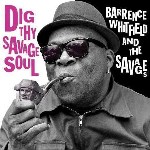As collections of vintage, long-lost garage rock and R&B go, this one’s mighty hot: The opening “Corner Man” has the primal pound of a prime Sonics track and recording quality to match; you can practically see the sweat on the recording console. “Blackjack” is just the sort of crazed instrumental (with a few vocal interjections) that lights up dozens of compilations. The singer screams his head off throughout, but when he tears into a ballad—like “I’m Sad About It,” which would sound like early Atlantic Records if the band was reined in, which it surely ain’t—you can tell the guy has serious soul.
Hold on, you say: This isn’t a reissue at all, but an actual 2013 recording? Boggles the mind, even if you know the backstory. The Savages were in fact formed in Boston back in 1984; guitarist Peter Greenberg and bassist Phil Lenker had spent a few years playing wild garage rock with the Lyres. In Barrence Whitfield, they found a screaming maniac in the Little Richard/Esquerita mold, but one who could also put a sensitive number across when he felt like it. The band tore up the Northeast and attracted some high-profile fans (Los Lobos still have Whitfield onstage whenever they’re in the same town), but imploded after two years. The ex-Lyres retired and Whitfield carried on, with various other Savages and sundry bands—getting deeper into soul and growing quite a bit, but never quite matching the abandon of the early albums.
Until the original nucleus reunited three years ago, that is; and Greenberg’s guitar pushes this one into overdrive. But the difference on this album—the second of the reunion, and first for a big-ish label since a fling with Rounder in the ’80s—is that half the material is original, and the covers are so obscure that they’ll be new to all but the most industrious collectors. A buried treasure like “Bread” (which, Whitfield claims, is the one thing that will impress the ladies) hasn’t lost its relevance; and he delivers both the screams and the soul. Since Dap-Tone and the like have revived an interest in classic soul, this could do the same for another disappearing musical form: rock and roll.





